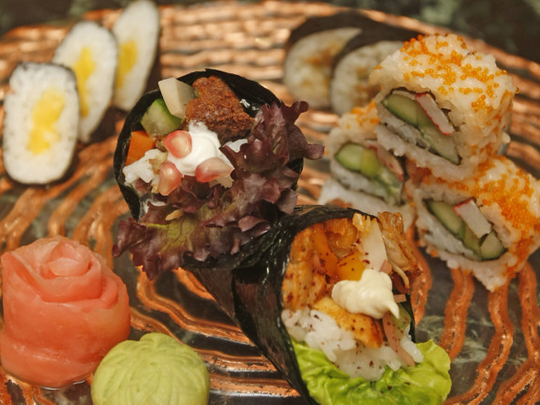
There may be other men who grew up in the US, lived and learnt in Japan and now work and reside in Dubai. But not all of them are chefs and it is safe to assume that none of them are quietly creating new, cross-cultural dishes.
For an American, Ronald Pietruszka is surprisingly soft-spoken. He has worked at some of the world’s most famous hotels for more than 25 years and his repertoire is surprisingly, even staggeringly large. And now, as Executive Chef at The Ritz-Carton, DIFC, he is whipping up an unusual surprise for guests.
It is called Arabian sushi.
At an exclusive tasting session hosted for EAT, Pietruszka explains the three cultural influences that have shaped his new and novel offering: the classic sushi-making traditions of Japan, the modern variations made popular by Americans and the meze that is so beloved to Arabs.
In effect, what he has done is create a series of dishes that looks and tastes like sushi at first and then explodes in the mouth in a delightful burst of Arabian flavours.
The presentation is distinctly Japanese. There is the cylindrical maki sushi, the thick futo maki and the thin temaki both with nori on the outside, and the temaki sushi — a large cone-shaped piece of nori with ingredients spilling out at the wide end (in this case, the ingredients include pomegranate seeds). Pietruszka spent three years working at the The Ritz-Carlton Osaka where he learnt the process of sushi-making, and in tribute, there is also the oshibako, a block-shaped sushi that is deemed a speciality of Osaka.
The fillings are distinctly Arabian. After the first tangy taste of shari, the cooked vinegary rice that is ubiquitous with sushi, the notes that follow are of evergreen Arabian mezes — falafel, tabbouleh, shawarma, pickled vegetables and the like. There is also a vine leaf sushi — an outer layer of nori-covered rice that, in turn, covers rice wrapped in vine leaf. “I have applied the techniques of authentic sushi preparation and infused Middle Eastern flavours to create a unique concept that we think will really appeal to our guests,” says Pietruszka.
It is worth noting that in Japanese, the word sushi does not mean fish, but only refers to the sourness of the dish in reference to the ancient process of fermenting and the heavily seasoned rice. And in this new Arabian sushi dish, there is no fish in any form.
Speaking of his culinary experiment, Pietruszka admits that he was very mindful about upsetting Japanese purists and passionate Arabs with this unique fusion of flavours. “I was hesitant and careful, but my confidence got a big boost when my Syrian Arabian Sous Chef heartily approved of the first two recipes,” he says. Since that first approval, there have been several experiments, improvisations and tasting sessions and the recipes have multiplied manifold.
Pietruszka oversees the hotel’s three restaurants and terraces and adds his flair to all the menus at The Ritz-Carlton, DIFC. Besides developing his signature sushis, he has worked on novel innovations at the Thai restaurant Blue Rain, and continues to add unique twists to traditional Arabian dishes.
With the Arabian sushi, he hopes to create a memorable experience for his guests. “It is what we do at The Ritz-Carton — create unique memories — and I hope this experience will stay with our guests long after they leave our Ramadan Garden.”
One of the most popular Japanese kotowaza, or proverbs, about food, is translated as: ‘You cannot eat the mochi in a picture.’ It refers to the immense popularity of the Japanese rice cake, but the futility of guessing at its taste by merely seeing a photo.
Enough has been said about a Japanese dish reinvented by an American chef in tribute to Arabian cuisine — right here in the UAE. To know it, try it. Arabian sushi will be formally launched for iftar and suhoor at the Ramadan Garden at The Ritz-Carlton, DIFC during Ramadan. Call 04 372 2323 for details.




